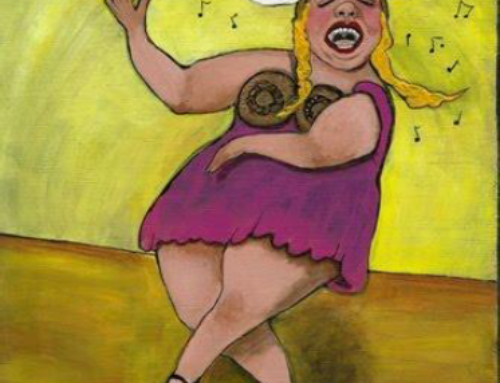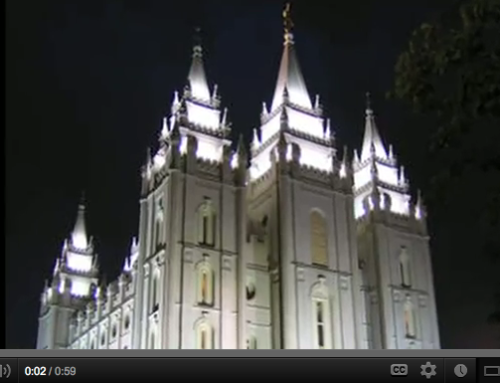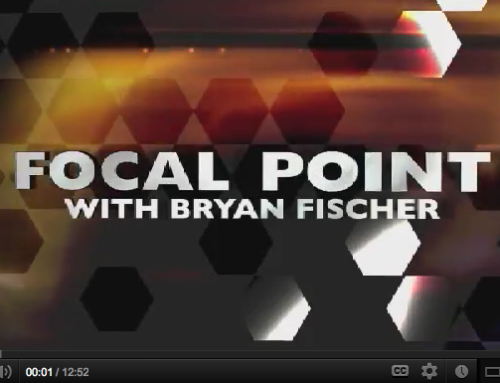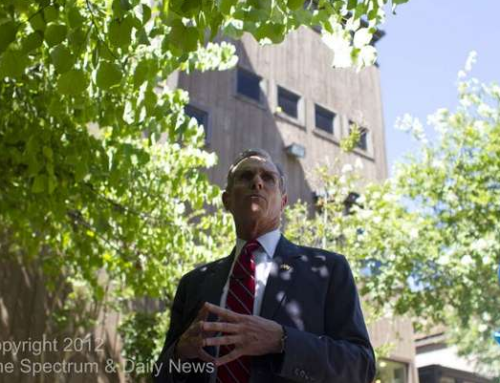
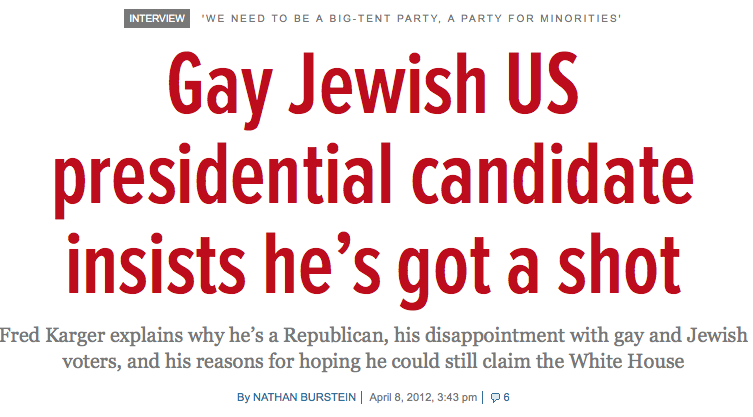
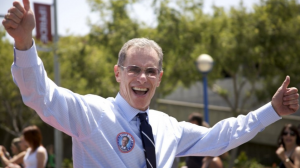 For link to story, CLICK HERE.
For link to story, CLICK HERE.
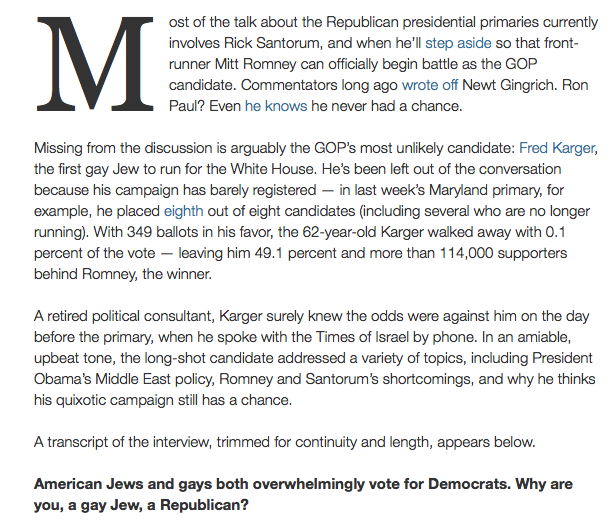 [Laughs] I have some opposition from both camps based on my Republican history. [But] I think you’re certainly seeing dissatisfaction with President Obama from the Jewish community. I’m a member of the Republican Jewish Coalition, which I’ve been a part of since it was formed over 25 years ago, and the growth there is astronomical, based on Obama’s treatment of Israel. I think it’s important to have Jewish voices in both parties, and particularly when we do get a president like Obama, who has seemed more supportive of some of the opponents of Israel than Israel… I think the Republican party needs to reflect balance as the Democratic party does, and the Jewish community should be represented on both fronts. Similarly with the gay community, which tends to be more Democratic — particularly the leadership, which I think is a mistake. Look at New York state, where four Republican state senators were the winning margin of votes to get gay marriage passed last summer… As far as being a Jewish candidate for president, I think it’s important, and certainly symbolic, that the first gay Jewish candidate is doing it as a Republican… The [GOP] seems to have gone so far right that it is excluding a lot of people. I want to make it more center and more reflective of all minorities.
[Laughs] I have some opposition from both camps based on my Republican history. [But] I think you’re certainly seeing dissatisfaction with President Obama from the Jewish community. I’m a member of the Republican Jewish Coalition, which I’ve been a part of since it was formed over 25 years ago, and the growth there is astronomical, based on Obama’s treatment of Israel. I think it’s important to have Jewish voices in both parties, and particularly when we do get a president like Obama, who has seemed more supportive of some of the opponents of Israel than Israel… I think the Republican party needs to reflect balance as the Democratic party does, and the Jewish community should be represented on both fronts. Similarly with the gay community, which tends to be more Democratic — particularly the leadership, which I think is a mistake. Look at New York state, where four Republican state senators were the winning margin of votes to get gay marriage passed last summer… As far as being a Jewish candidate for president, I think it’s important, and certainly symbolic, that the first gay Jewish candidate is doing it as a Republican… The [GOP] seems to have gone so far right that it is excluding a lot of people. I want to make it more center and more reflective of all minorities.
It’s looking like a long shot that you’re going to get the nomination. How would you describe your campaign experience? Did it accomplish what you were hoping?
I’ve always been a long shot — I’ve said that from day one. I’ve never run for office before. My entire goal, and it still is, is to get in one debate, and if that happens, anything is possible. We’ve seen what happened to Herman Cain, a classic example — he was in the first debate in South Carolina last May, and he went from zero to ahead of Romney in Iowa. So my strategy was two-fold: It was to get into one of the early debates. I came very close — I qualified for the Ames, Iowa, Fox News debate last August, but then they changed the rules to keep me out… Now I’m hoping that the field narrows to two, and I’ll be the third candidate… That has been my strategy all along, and we’re right on track.
With the election seven months away, the GOP is making its quadrennial effort to peel Jewish voters away from the Democrats. Eighty percent of Jews supported President Obama in 2008. Do you think that will change this time?
Absolutely. The bloom is off the rose with Obama. We saw from his first Middle East visit, to Saudi Arabia, his courting of the Palestinians. Everything he has done has driven away many Jewish-Americans — not only from his camp, but from the Democratic party. I was just at the Republican Jewish Coalition winter conference, and there’s this growing number of people who have never been involved before in the Republican party who are coming over. We’re just seeing the fact that President Obama has never visited Israel, our greatest ally in the region, who we’ve always stood behind. It is very symbolic that he has not visited the country yet. [Obama has in fact visited Israel twice, but not since his trip as a candidate in 2008. — NB] I think that in trying to balance his foreign policy, he has tilted too far away from Israel, leaving Israel at great peril, and this country as well, because Israel’s enemies are our enemies.
Your campaign website features an image of your birth certificate. What is your view of the so-called “birther” movement, which keeps falsely claiming that President Obama wasn’t born in the US?
I just put that up when I put my website up — I wanted to show my qualifications for office as a US citizen. That’s all that’s about. I’ve never, ever criticized President Obama for not being born in this country. That’s rubbish, and a false charge. I think [Obama’s US birth is] something that’s been proven.
Let’s talk for a minute about your own background. What has being Jewish meant in your life and politics?
It’s just such a big part of me. It’s the way I was raised. My parents instilled in my brother and me the basic tenets of the religion — to be a good person, to give back, to give to those in need. My grandfather and his father were activists 100 years ago, when the Jewish community faced many of the same problems — workplace discrimination, housing discrimination, hate crimes — that the gay and lesbian, bisexual and transgender community faces now. While I never knew my grandfather, I feel close to him, particularly as I undertake being a gay activist, which is a relatively new part of my life. I’ve always been involved, always behind the scenes, but he and his family took the lead in forming the Jewish Federation, which was called the Jewish Alliance then, and really did what they didn’t need to do, but they did so to help others. And that’s what I’m doing now: I’m okay, I’m fine, but there are so many in my community who are not.
How observant are you?
I’m Reform. I’m a member of Temple Kol Ami [in West Hollywood]. I’m not as religious as some of my ancestors, but I still feel very close to the religion, and particularly to Israel. My first trip to Israel, in 2000, the first of many, was what really helped bring me back to my roots and to my religion. It had a tremendous impact, and I’ve gone on missions and other trips there, and I just feel a tremendous allegiance and loyalty. It brings up everything in my family and past that is important.
You’ve said that President Obama was “sleeping at the switch” during Egypt’s revolution, and that the US should pull its troops out of Iraq and Afghanistan. You also supported intervention against Gadhafi’s Libya. What do you think of Obama’s Middle East policy?
Well, I’m not quite sure what it is — I don’t know if President Obama has a Middle East policy. He’s trying to be everything to everybody, and that is a mistake. It might work with disputes in this country, but it doesn’t work on the international stage. We have friends and allies, and we need to stick by them, as they do by us. By trying to build too many bridges publicly, I think he is making a tremendous mistake. I am a James Baker protégé — he was George H.W. Bush’s secretary of state, and… he did things as they do in diplomacy, very quietly, and I hope that President Obama is doing similar activities to try to bring about peace through a third party or the state department. But I think his public stance and comments are not in keeping with what foreign policy for this country needs to be.
If you were elected, what would you do to end the Arab-Israeli conflict?
I think we need a two-state solution. I think we need the highest level of diplomacy, and oftentimes to use other countries as intermediaries. We’ve done that before. It’s obviously a problem that goes back for generations and generations. It’s very difficult to solve, but I think we have that ability. Particularly with the changes in the Middle East, we have the potential to create more democracies — younger people there are much more interested in peace and prosperity and democracy. That bodes well for the future, and the United States needs to keep a hands-on approach there because we cannot let this spiral out of control.
You’ve worked as a campaign strategist for decades. What do you make of this extremely volatile Republican primary, in which so many candidates have led the polls? What does that say to you about the state of the Republican party?
[Laughs] Well, it’s less about the state of the Republican party and more about the state of Mitt Romney. The Republican electorate is just not excited about him, and never has been. He may get [the nomination] by default, but there are just a few things missing. I think a lot of it is the fact that he’s abandoned his core — he’s just all over the place. He’s very awkward and uncomfortable in this role, and I’m not sure why he’s actually running. He’s someone who’s truly not enjoying himself. So it’s very fluid — that’s why I’m sticking with it, because I think that if the American public gets a look at Fred Karger, I might be that flavor of the week, which might last through the [Republican] convention. So I’m not going anywhere — I know there’s a lot of unhappiness with the field, a lot of people unhappy with Rick Santorum. I think he’s doing tremendous damage to the Republican party, driving away younger people and anyone who has a more moderate position.
Mitt Romney and Rick Santorum both oppose gay marriage, one of your signature issues, and they have been the top two choices of Republican voters. What does that mean to you about your place in the party?
Mitt Romney has at least extended the olive branch recently and said he is against discrimination against gay and lesbian Americans, and he is not as strong an opponent of gay marriage, and does not say the horrible things that Rick Santorum does. I’m of course torn — it’s very difficult to be part of a party that says and does such terrible things to my community. Certainly our Republican platform of 57 pages has terrific things in it… Younger people are looking for jobs and are concerned about education and foreign policy, and social issues are just not on the front burner, and it’s driving them away. That is what Santorum is doing: scaring away a generation of potential Republicans in his short-sighted appeal to be president. I’m working the opposite approach, to bring younger people in by de-emphasizing social issues and talking more about practical issues, the innovations needed to move this country forward. I am fighting from within. I get asked a lot why I’m still a Republican. That’s a very reasonable question. I grew up in a very different Republican party, and I think that the Republicans need to return to those roots, not excluding anyone, as some may want to exclude me. We need to be a big-tent party, a party for minorities. We need to welcome everybody, and that’s one of my reasons for running.
It looks like Mitt Romney is going to win the nomination. You’ve long opposed his positions on gay rights, and the role of his church, the Mormon church, in thwarting them. Will you endorse him?
I’m not ruling Fred Karger out just yet. I’m one debate away. I think if I can get into one of these late debates, then I’m still in it. So I’m going to reserve any judgment until I’ve left the race, if that is what happens. Right now I’m in it to make a difference and be at that debate and to be considered a candidate for president. So no decisions yet.
What would you say are the main surprises you’ve had or lessons you’ve learned during this campaign?
I was very surprised at my treatment by some of my presumed allies. I thought I would be treated with better regard, certainly by the Jewish community and the [LGBT] community. I understand both are very Democratic constituencies, but it hurts a little bit because these are my natural bases. I relate to both so intimately, so it’s a little surprising that more people aren’t jumping on board. But what has really been the reward is the outpouring of support I’ve gotten from primarily younger people from all walks of life, from all communities, that are so excited about what I’m doing, about my message of inclusion, some of my out-of-the-box ideas, and they’re the ones who are rallying around and really making it all worthwhile. It’s been an absolutely incredible ride.
Will you run for office again?
[Laughs] I’m pretty exhausted from this nonstop activity for 25 months. I can’t anticipate another run for office. This is my first, and I’m thoroughly enjoying it, but I think this is probably it.
